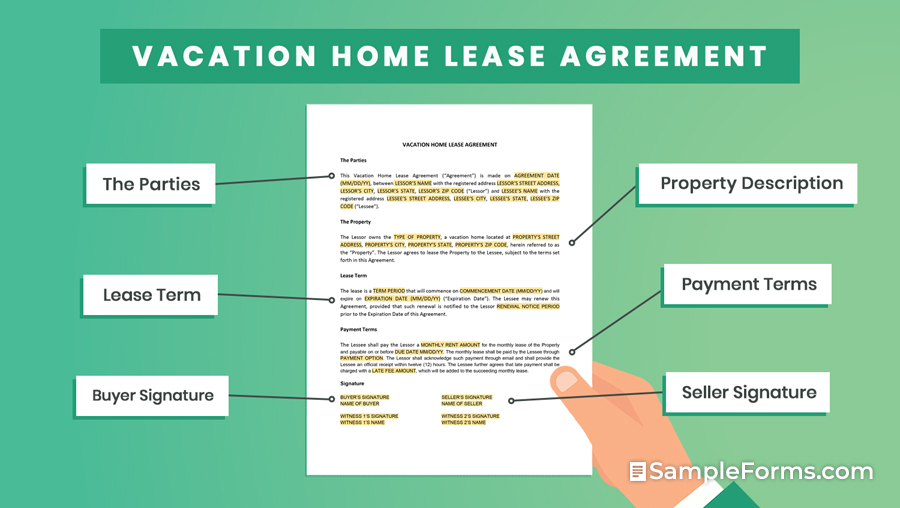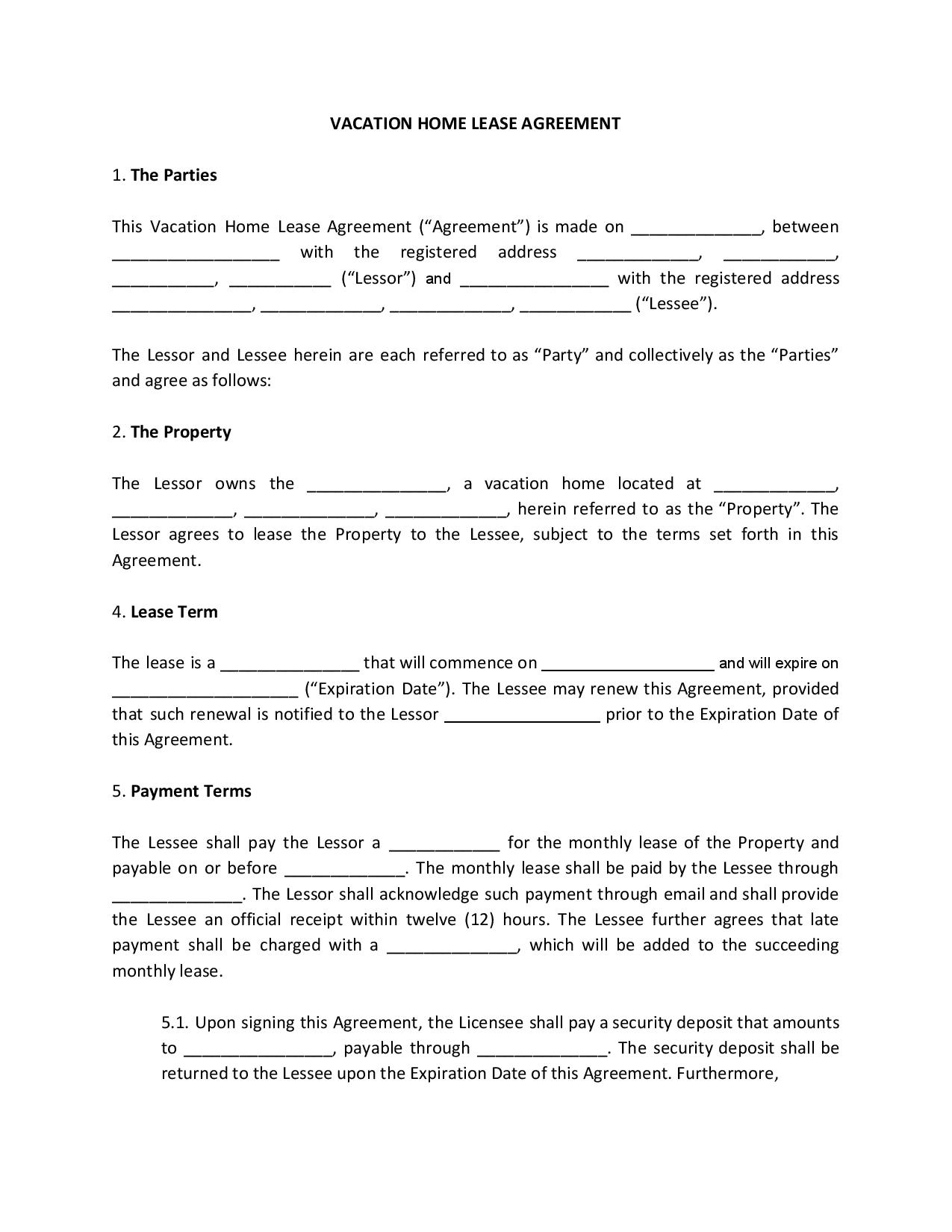- Eviction Notice Forms
- Power of Attorney Forms Forms
- Bill of Sale (Purchase Agreement) Forms
- Lease Agreement Forms
- Rental Application Forms
- Living Will Forms Forms
- Recommendation Letters Forms
- Resignation Letters Forms
- Release of Liability Agreement Forms
- Promissory Note Forms
- LLC Operating Agreement Forms
- Deed of Sale Forms
- Consent Form Forms
- Support Affidavit Forms
- Paternity Affidavit Forms
- Marital Affidavit Forms
- Financial Affidavit Forms
- Residential Affidavit Forms
- Affidavit of Identity Forms
- Affidavit of Title Forms
- Employment Affidavit Forms
- Affidavit of Loss Forms
- Gift Affidavit Forms
- Small Estate Affidavit Forms
- Service Affidavit Forms
- Heirship Affidavit Forms
- Survivorship Affidavit Forms
- Desistance Affidavit Forms
- Discrepancy Affidavit Forms
- Guardianship Affidavit Forms
- Undertaking Affidavit Forms
- General Affidavit Forms
- Affidavit of Death Forms
Vacation Home Lease Agreement
Whether you’re marketing a home sitting on a fairly known or popular travel destination, you’ll want to have the leasing factors done right. Comfort, and sometimes even luxury, is what people look for in a vacation home. And that is what you have to sell them. But first, you need to know about the basics of a vacation home lease agreement. This article will also teach you how to create a lease agreement so that you can have offers flying in, for your vacation home. Read More
Vacation Home Lease Agreement
What Is a Vacation Home Lease Agreement?

A vacation home lease agreement is a legally binding document between a property owner or the property owner and renter with regards to the vacation home rental. This vacation property is used for leisure or business purposes—providing temporary shelter to the renter for less than 30 days. It embodies the responsibilities of the property owner and its occupants along with the payment terms, fees, and conditions. Cabins, beach houses, and holiday cottages are other terms associated with a vacation home.
According to VRM Insider, the United States had a vacation rental revenue of USD 14.458 billion in 2019. In the same year, the same industry had a growth rate of 6.4%. Vacation rentals offer more privacy to guests compared to hotels.
How to Write a Vacation Home Lease Agreement?
The vacation home should be well-maintained throughout the renter’s stay. To ensure the well-kept and clean status of the property even after the agreement ends, create an agreement. Here are the tips:
1. Identify the Parties
You may have found your renter on a website that advertises rental properties. And the internet is full of shady people that like victimize people for the sake of humor. Meet with the prospective renter and ask for their official identification cards. Once everything is finalized, identify in the agreement as to who the property owner and the renter are—along with the mailing addresses.
2. Determine the Duration of the Stay
The duration of stay helps determine the payment. Ideally, vacation home rentals are less than 30 days, but it entirely depends on the agreement you have had with the renter. Identifying the starting date helps you prepare the vacation home days prior to the renter’s move-in. Some of the services and the amenities that you need to prepare are the linens and pillows, the internet, home appliances, cable, toiletries, cleaning service, and towels.
3. Research About State Laws
Before listing your vacation home for rent, you should already be educated with the State laws to prevent potential lawsuits in the future. The State laws will be your reference before making your terms and conditions of the agreement.
4. Insert Your Terms and Conditions
After specifying the identities of both parties, establishing the payment, fees, deposits, and providing the legal description, indicate the terms and conditions. Stipulate ground rules and who should be responsible for providing such. Your contact number or the manager’s should be included should the renters have concerns. Remember to align your terms and conditions with the local and State laws.
5. Finalize with Signatures
Seal the deal with the signatures of both parties. The signature should be accompanied by the names of both parties and the date signed. Provide a copy of the agreement to the renter and keep the original copy.
Renters who are renting the vacation home for leisure are more likely to throw a party and trash the property that leaves you in a rather problematic situation—unless you have insurance. Such action constitutes an immediate eviction and to spare you from this dilemma, explicitly state what other grounds constitute for immediate eviction.
Frequently Asked Questions
What do you mean by short-term rentals?
Short-term rentals refer to fully furnished properties are available for short-term periods. While for long-term rentals, such as annual rentals, the properties are commonly unfurnished. Short-term rentals are an alternative to hotels and offer more privacy to guests.
How many days are considered short-term rentals?
Short-term lease ranges from 30 days to six months.
Do I need to provide a lease agreement for online booking platforms?
Yes, according to Evolve Vacation Rental, if you are using Vacation Rentals by Owner (VRBO) or Airbnb, you will be required to provide a lease agreement upon signing up. The renter will be legally bound to the terms and conditions of the agreement upon booking.
What should be included in a vacation home lease agreement?
The vacation home lease agreement should have the identities of the parties, property description, number of guests, rent duration, monthly rent, deposits, fees, and other terms and conditions that you demand from the renter. The whole short-term lease agreement shall be governed by the State laws in which it is located. Then, the agreement shall be closed with the signatures of both parties.
Can the property owner charge me after I move out?
Yes, according to AHRN, damages caused by the negligence of the renter and their guests can be charged to the renter even after they have moved out. However, the property owner may also deduct the security deposit for the repair of the said damages. The property owner should be able to provide documentation to support their claims. Exemptions for wear and tear should be explicitly stated in the agreement, so the property owner knows when to charge the renter.
Vacation is the perfect time to unwind and to let ourselves be free from the expectations and pressures of the mundane life. Such liberating experience may reveal the wild side of us and may cause us to lose all the inhibitions. All property owners should know these. Vacation rentals—especially for leisure purposes, are expected to have minimum to maximum damages. You can help prevent these by crafting a vacation home lease agreement. The agreement forces the renters to be at their best behavior for the entire duration. Sure it’s cool to let loose and have fun, but let loose and have fun responsibly.

